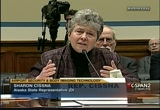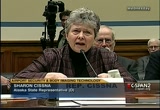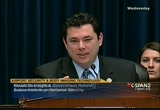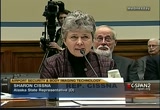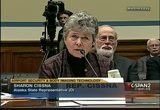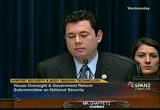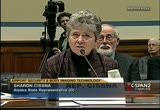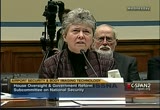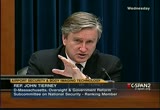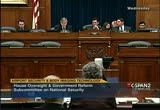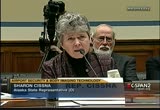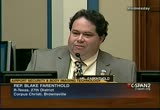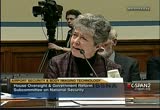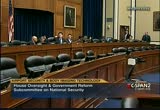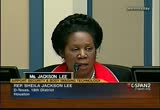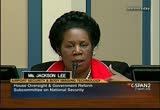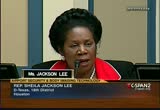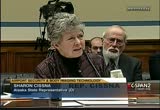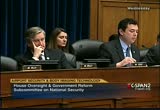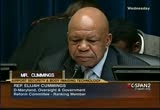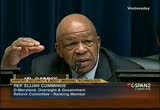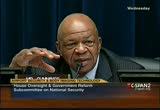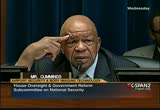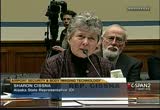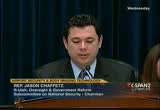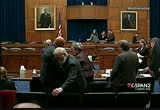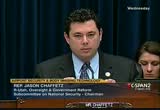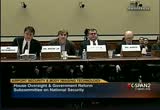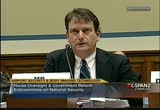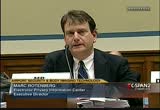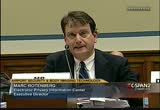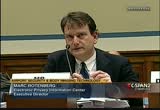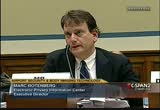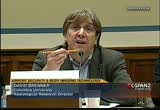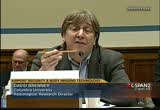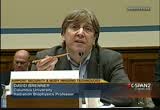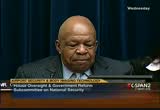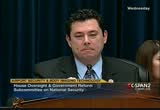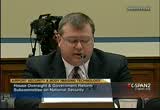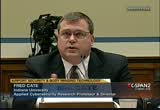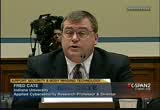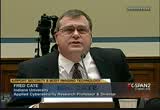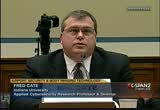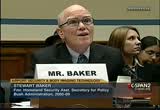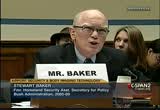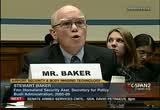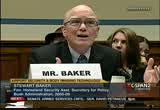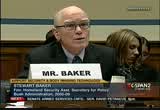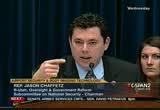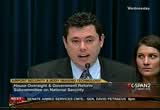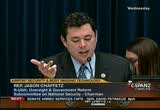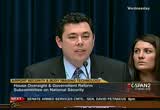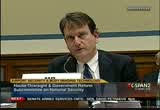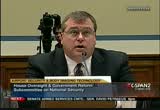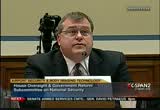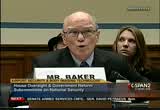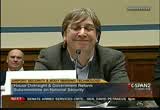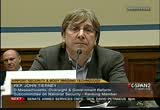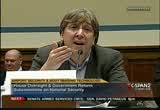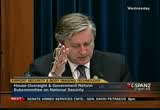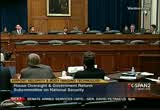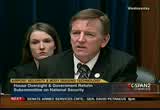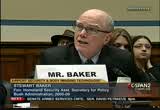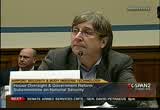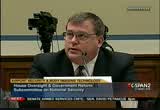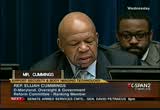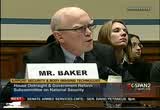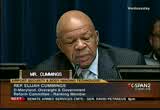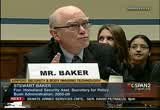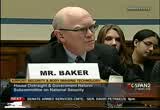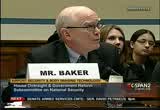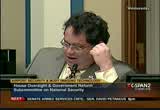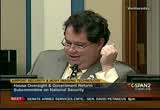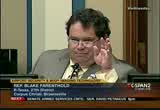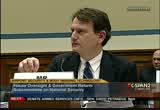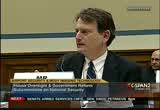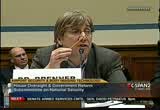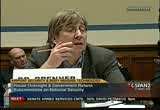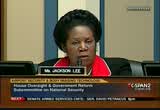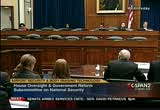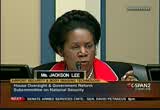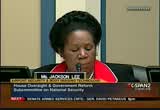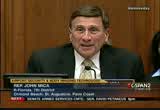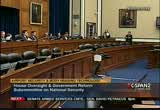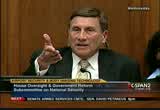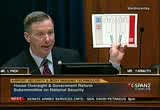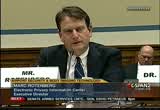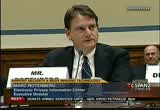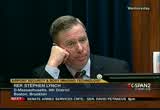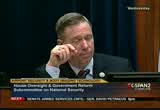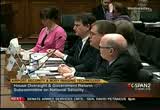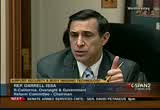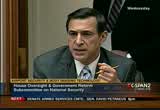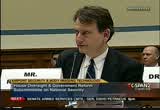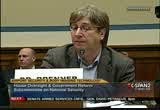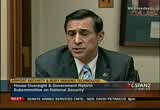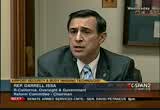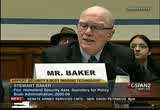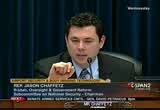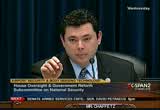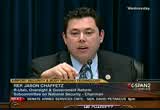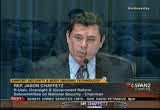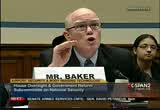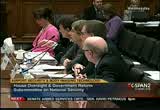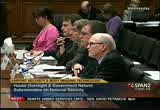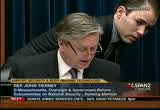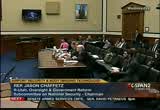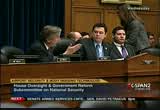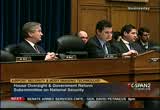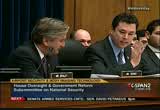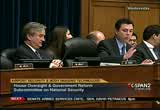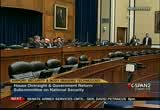tv U.S. Senate CSPAN March 18, 2011 5:00pm-7:00pm EDT
5:00 pm
suddenly find myself having gone back to the doctor and finding myself at the airport again andg thinking something had changed at the airport by myself with a full body scan, which i haven'tb worried about. i have heard many people worry about it. but what happened after that was a face the woman and my husband and i had talked about it. i had vowed that i was not ever going to go through that again and i said no. what i found out after having said no and having really felt better after that because i actually was starting to protect myself, and i to this moment feel very proud of having done that. i said to myself, right in with all of the huge numbers of people who have been harmed, and i have received well over a thousand letters, e-mails,
5:01 pm
facebook with this. .. >> every time every day i have stories of how they are harmed. i sent in my statement that i e-mailed to you folks, many of the comments that were made, but i've also witnessed exactly how alaska does deal with this, and the minute i got back to alaska, the thing that was amazing to me is my legislature passed this into the house on how i had done the right thing, that it was the right thing for me to have done, and they have put out a resolution that is to come to you, and it goes through all of the different things that -- and
5:02 pm
the most important is how important air travel is to us, but how alaskans have been harmed. we are four times -- we travel four times what the rest of the united states does. all the other members of the citizens that travel, and i think i'm supposed to be ending here. i hope you'll read the rest of my comments and any other questions, please ask. >> thank you, and thank you for that testimony. we'll bet the balance of your testimony into the record. i'd also like to ask unanimous consent that the resolution from the state of alaska be entered into the record. without objection, so ordered. i'd like to recognize myself for five minutes, and then each member. one of the hallmarks of the united states of america is the commitment to the fourth commitment, unreasonable search and seasuire.
5:03 pm
how do we find that balance and what was your personal experience and there's many who argue if you choose to go on an airplane, then you choose to give up those rights. can you sure with us your perspective? >> thank you very much, mr. chairman. mr. chair, it's absolutely true for alaskans that we don't choose. we don't have a choice. i did make my way back to alaska after that event at the airport on the 20th of february, but it took four days. it took four days, and i was really lucky because i was able to find in canada someone to fly me and so then i was able to take the marine highway and get to alaska that way. for people in remote parts of the state, what happens is that they oftentimes it's their first
5:04 pm
time away from those remote places, because of operations, have to fly out of the state, and there are patient at that time and i hope they get consideration at that time when they go out. we don't have the level of screening because it's metallics that in the metal detector that we get screened with so far. that's what would have them felt up, but after they come back, after they have the operation, when they leave the operating scene and the hospital, what happens is they're picked up by maybe a taxy, taken to an airport, and they become not a patient unless, but just a standard citizen. that's what i heard from the care givers in remote alaska and talking about is that they then, not only is it the stretcher or
5:05 pm
the wheelchair or whatever their brought to in the hospital, that has to be searched, taken apart, and they are very invasively examined. this is absolutely -- mine was not anything compared to what it would be for these people, and this is alaska. this is the experience they go through under the current system, and that's what the legislature is hoping we do is revert to the less invasive. >> certainly, we have to secure airplanes. there's a terrorist threat. >> absolutely. >> but you would never pass somebody who has some sort of prothetic device or an implant device or something like that in theory should not pass or get through the whole body imaging machines and others, so do you have a suggestion as an
5:06 pm
alternative? >> the fact is that until february 20th, i really had not thought much about this. i just kind of -- well, actually it was actually in october that i really started thinking about this, not october, november, but i have had many, many letters from many, many different people who traveled all over the world, been through all kinds of screening devices. as i understand it, there's two close friends go through in this last year, and both in holland and israel. they have extraordinarily successful screening devices that are very noninvasive, very. >> your personal experience, going back to the fourth amendment under reasonable search and see see sure, these
5:07 pm
pat downs are invasive nonetheless. many of us believe this would be deemed a sexual assault on a person. >> absolutely. >> your personal expectative, 30 seconds here, based on what you've experienced in the pat downs, how would you relate that to the fourth amendment and the definitin of an assault? >> i think it's absolutely an assault, and it is the worst kind of assault in that it's essentially similar to reactions that people get with that. what i haven't seen are studies. what i'm not seeing is the oversight that gives us a chance to really look at this and find out what's happening to our americans. i'm worry the about my state, but also my fellow americans. >> thank you, thank you, appreciate it. recognizing the gentleman from massachusetts for five minutes. >> representative, thank you for testifying today, particularly
5:08 pm
the difficulty is caused you, and it wasn't an good experience and it's not easy to testify. thank you for coming this way to testify today. you hit it on the head. everybody would like a less invasive, but equally effective process on that. that's what the oversight is trying to get to is that path. in the opening statement i made reference to the fact there is apparently a technology there that is being tested that would not give a full body image, but rather like a gumby or a stick figure and identify the only anomaly like if there's something strapped to your leg, and that's the only area patted down or investigated. do you have a feeling about that aspect of it? do you think that that's still a problem? >> the problem appears to have been the not having done
5:09 pm
adequate study for their not to have been really the time taken to make sure that we're doing no harm, and that's -- that's the most critical role any lawmaker has is to do no harm, and not taking the time is something i think we have to fix. that is -- that's doing our job. >> i understand your take on that, and i understand congress has to take responsibility for that with the so-called shoe bomber after they faced the confrontation of doing nothing and that seemed in their collective wisdom to be the way to go because the situation was there and they did what they thought was best at the time and was told that was effective. my question in particular was if there's not an image of your individual being up there like a stick figure or whatever, and if there's an anomaly detected in an isolated location of your
5:10 pm
body, and that area is the only area inspected, what is your reaction to that process? >> i think you have to look at the whole process. one triggers the other. it's created -- and the thing that's the most troubling to me is that as i look add all of the -- look at all the people on the airplane getting on, they are all guilty before they are proven innocent, and that we got to get away from that. we got to really start respecting people. >> i guess, are you saying basically let everybody on unless they have a tell-tale sign? >> absolutely not. absolutely we have to do the kind of screening that gets us the best result, but it doesn't have to be the -- thee technology that is there now is not -- >> i get that. i wanted your opinion on an alternative one, but you don't want to give your opinion on it. >> not without facts, proof that it's good.
5:11 pm
not without proof that we've done our job. >> that goes without saying, but i'll yield back. >> the gentleman yield back. now recognizing the gentleman from texas for five minutes. >> thank you very much. and i can understand what you've been through. both my daughter and i had the misfortune of triggers these machines with an anomaly and the search we both endured was very invasive and you have the greatest empathy from me. one the things you didn't address or if you did, i was racing through your testimony and didn't hear it. my question is would you be willing to submit to some form of background checks surrendering your finger prints to get into a trusted traveler program to get in a more trusted security? >> i would consider that to be
5:12 pm
reasonable, and that kind of alternative is one. there are others also that are doing -- using psychological procedures that actually help create a profile, not a racial and not a cultural profile, but one that actually will scan that identifies people who are obviously up to no good, and there are ways of coming up with that. that's been found in other places, but it's a matter of actually looking elsewhere and seeing if there aren't other options. there usually are. >> it's my understanding that the tsa profiles boxes, but they don't pro file passengers. they profile a box based on its shape, country of origins, and
5:13 pm
from where it was shipped from. we take no effort at all to determine if you're flying in from, you know, middle america or a foreign country that's hostile to us. your level of screening is the same. that defies logic. that's not a question, but a speech. i'll yield back my time. >> we recognize the gentlewoman for five minutes. >> i thank the chairman, the committee, and the ranking member of the subcommittee especially for their curtesies, and i thank the chairman of the full committee and as well as the ranking member of the full committee for their curtesies. it's a pleasure to see you this morning. i'm not on this committee, but the ranking former chair of the transportation security committee with oversight over tsa and on the homeland security committee. i will tell you that many of my waking hours address the question of professionalism and
5:14 pm
more training for the transportation security officers, and i think you would venture to say as one who needs flying as a mode of transportation that in most or many instances, our tso officers work within the realm that they have and use the skills in an appropriate manner, but you are right. we have to look at those issues that our colleagues have indicated may impact the fourth amendment, may impact the dignity of all travelers. i want to put on the record that i am going to join with the ranking member of our committee, homeland security, thompson, writing a letter to ask for alternative protocols for individuals in your situation and also individuals who are traveling with medical devices and traveling with other medical
5:15 pm
equipment, traveling with a caretaker, and we expect to hear from them very soon and working with this committee. i do want to pose -- i look forward to utilize your testimony, your written testimony, and listen to my friend and colleague from texas about the trusted traveler and there are a lot of options that we could look at. my question to you would be to establish the fact that there are threats to the united states. you still believe that that is the case, is that true, representative? you have to be oral on the record so they can report it. >> thank you, thank you very much. yes, i certainly do agree with you, and it's absolutely essential living where we do on the northwest perimeter of our country. we're right there. we're at the place where we really need to be constantly alert and that's exactly why i
5:16 pm
have the feelings i do is that i need to keep my population safe and strong so that they can be watchful too. we're the ones who are going to see trouble coming from another direction. >> you have the eyes and ears. >> yep. >> we laid that ground work and we know the transportation security officers play a valuable role in that, and you too watched that fateful christmas day when we saw a unique effort of trying to blow up a plane and harm the united states, the christmas day bomber. that generated this enhanced review if you will, so would you offer to me any other thats you have about briefly on what enhanced security measures you think we should take? >> thank you very much, and the list of things that you're asking for, some kind of an
5:17 pm
exemption or a way people can avoid the more intense kinds of screening, any kind of prothesis at all is a problem. any kind of, not just medical, but when people have pacemakers, and the things that people are going through is just amazingly severe, and i agree with you that the tsa employees that i've seen are doing a really good job of improving their attitude, their treatment of the public seems to be improving, and so it's the procedures itself. >> just a few more minutes if i might just say. have you gone through an ait machine? have you gone through those moshes? -- machines. >> that is the full body? >> yes. >> yes, i did twice actually.
5:18 pm
>> that's when they found something in one -- my point is to conclude by saying on that point you went through the ait. we thank you for that. we need to look at protocols that then respond to how we address individuals with medical concerns, devices, pros thet ticks, and with that, i yield back. thank you for your curtesy. >> thank you, glad you could join us. we now recognize the ranking member from maryland. >> thank you, first of all, representative, i want to thank you for being here today. sometimes when we are addressing issues that are very personal, it's very, very difficult because what it says is that we are opening up ourselves to the
5:19 pm
public, so we'll be watching you on c-span tonight, some of them are washing you right now, and so you not only become exposed to, you know, a few folks, but you basically become exposed to the whole country, and for that, i thank you because you said some things that really touch me, and there's two elements that kind of hit me. one you talked about the training and whether this person was properly trained and you talk about curtesy, and then you also talk about the invasiveness and the medical situation, and some kind of way, and then you also talked about how there's
5:20 pm
some things that people just should not have to go through, and i guess, you know, i'm just trying to make sure that we strike the balance. one thing for sure is we can try to make sure the tsa administrator brings some type of sensitivity training if they don't already to their folks. i have relatives with experience with medical situations and they have certain devices that might send off any machine or whatever, but i can understand that. they need to be sensitive to that too, and there's nothing that is worse than somebody not being courteous to another human being. president obama has said something that i wish i had up vented myself --
5:21 pm
invented myself. he said, "sometimes in our country we have an empathy deficit." empathy deficit. we've got to -- what i'm hoping is that your testimony will allow us to strike the balance, and i know you want -- you fully understand safety, but you also understand privacy. you understand making sure that a plane doesn't come down out of the sky, but you also are making sure -- you also know that there are millions upon millions upon millions of people who travel who don't have an idea or even think about bringing harm. it's a tough one, and so, again, i want to thank you because i believe that your testimony will help us try to get to that balance that we need, and i've
5:22 pm
said so often when we go through something, it provides us with a passport because we have experienced it, to help other people and to help address their problems because we become the greatest witnesses. somebody just saying it, talking about it is one thing, but when you've been through it, that's a whole other thing. i don't have questions. i just wanted to thank you, thank you for after going through all that you've been through and being exposed all the ways you've been exposed and now to even go through another exposure for the sake of balance, for the sake of safety, for the sake of the rights of all of our citizens on behalf of our congress and of our nation, i take this moment to simply say thank you. with that, i yield back. >> gentleman yield back.
5:23 pm
representative, we're concluding the first panel. do you have any concluding comment you want to make briefly? >> thank you, mr. chair, and mr. chair, actually, the comment that all of this has brought to me over the last several weeks that i've been really the focus of a huge number of people coming and telling me things they haven't told other people is that the sense i've gotten is there is many people who have been losing the trust of their government through this kind of thing and that doing this right, that's one of the things that we really do is we win back the hearts of our people, and i believe in government. i think government is the answer in its own way, and it needs to keep that idea in a balance. we need both public and private,
5:24 pm
but government can answer a lot of problems that we have, but without trust, we're not going to keep the kind of democracy we have, so thank you. >> thank you. thank you. i appreciate your time, your bravery for being here and sharing a very personal story. it represents the story of a lot of americans, and we thank you for the time and effort that you've taken to be here. it's a long trek to be here, but i assure you it's worthwhile. we thank you, and god bless you. for now, we'll go into recess here for five minutes while we prepare for the second panel. thank you. [inaudible conversations] [inaudible conversations] [inaudible conversations]
5:25 pm
5:26 pm
[inaudible conversations] >> the meeting will now come to order. starting our second panel with a note by mutual agreement we're told that the tsa will show up at 12:15, so we are going to try to have a third panel at 12:15. nevertheless, we. -- we want to start with the second panel, and we appreciate you being here today. i'll do brief introductions and sweer you in. mr. marc rotenberg, dr. david brenner is a physician of by yo physics, mr. fred cate is a senior policy adviser at hundredton and williams, and
5:27 pm
mr. stewart baker is a partner of steptoe and johnson llp. we appreciate your credentials and look forward to your testimony. all witnesses will be sworn in before they testify. please rise and raise your right hand. do you solemnly swear the testimony you'll about to give will be the truth, the whole truth, and nothing but the truth? let the record reflect all witnesses answered in the affirmative p. we will now start with opening testimonies. we would appreciate if you limit your comments to five minutes, but your entire written statement is part of the record. mr. rotenberg, you're recognized for five minutes. >> thank you, mr. chairman and members of the committee. i appreciate the opportunity to appear today before you. i also wanted to thank you personally for the leadership that you have shown on this particular issue which is of great concern to the american
5:28 pm
public. i also want to begin by saying that epic fully appreciates the important mission that the tsa has in the importance of protecting aviation security. there's no dispute about that today. what i'd like to do is describe for the committee the work that we pursued over the last five years concerning a particular airport screening technology that the tsa has adopted and now hopes to widely deploy in u.s. airports, and that is the body scanner technology. we became aware of this technology almost six years ago. we followed it at the very beginning the concerns raised about the privacy impact, about the health impacts, and also w4r the technology would be effective. we were cautious at the outset, and we wouldn't make any strong statements until we obtained more facts to understand how the technology would be used, so it began a series of freedom of information act requests.
5:29 pm
we were trying to understand the tech technical specifications, the protocols, contracts arranged with the venders, and we began to work with expert organizations, civil rights groups, groups across the political spectrum, and groups in the travel industry. as we became aware of the concerns raised, we've joined with the organizations and submitted a petition to secretary that poll tan know in the spring of 2009 shortly after we learned of the tsa's plan to make these body scanners the primary screening technique in airports. this to us seemed like a sharp departure from what the agency previously said about this technology, and so 30 organizations wrote to the secretary in the spring of 2009 and respectfully asked her to conduct a applicant rule making
5:30 pm
so -- conduct a public rule making so there's an opportunity for the public to express views on the tsa's program, and so the tsa's decisions on the comment were ultimately subject to some type of judicial review. we urged her to suspend further deployment of the technology for primary screening because we felt the case had not yet been made, that they were sufficiently tested, and i will say, mr. chairman, it was around this time as well that your bill which you introduced in the house passed through the house with more than 300 votes which was essentiallyng t which was essentially trying to drive the agency back to the same position, to keep these devices for secondary screening where they might be used for special cases.bit now, the story actually gets quite a bit more interesting because in january of 2010, we 2 obtained the first set oft documents that we had requested under the freedom of information
5:31 pm
act and i've attached my testimony just a couple of pages.co we actually have thousands of pages. is the description of the devices, and the second category is traveler complaints that the agency has received. now the description of the devices, talking about the procurement specifications and the vender contracts are very significant. what these documents reveal is that the devices was tsa described to the venders, in other words, the specifications that the agency outlined was for devices that had the ability to store and record and transmit images of the naked human body. now, i'm quite sure there's going to be some back and forth this morning about that -- what that means. the agency says they don't save the images, store them for a temporary basis, and then they are deleted.
5:32 pm
i want to make clear we have been in a lot of litigated similar issues and have obtained more than 100 images of a body scanner device very similar to the one used by the tsa. this is used by the marshall service in orlando florida in the courthouse of the images routinely stored and record the. the tsa itself subsequent to the documents acknowledge they were storing and restoring images in test mode. when chairman thompson pushed further, they were storying images in training mode. now the agency has over 2,000 images and we're referring back to the tsa, details images. 2,000 they are not turning over to us because they don't want the public to see this for whatever reason. i will conclude. there's a lot in my testimony, but just in conclusion, the
5:33 pm
privacy issues here are enormous. the fourth amendment implications are e nor nows. there's the harm we see and the harm we can't. that's what i'm here to discuss. >> thank you. dr. brener, same thing, pay attention to the light, and we now recognize you for five minutes. >> thank you, mr. chairman. my name is david brenner, professor for radiation research at the columbia university. i think one should preface comments by prove the scanning of humans at airports is both desirable and clearly necessary. as you know, there are actually two different ait advanced imaging technologies currently
5:34 pm
deployed. that's x-ray scannerrings and millimeter wave scanners. in many ways they operate in the exactly the same way, both the analogy of radar. the difference as in the name is the x-ray back scanners use x-rays, millimeter waves do not, and these radiation doses is proven that x-rays are a cars -- cars jen. i will focus on x-ray back scanners. the individual risk, the risk of one average person going through the scanner once. the dose is involved is extremely low, and that means that the risks and risks we're talking about are long term radiation induced, also
5:35 pm
extremely low. in fact, we can put numbers on those risks so the risks of an average person going through the scanner, their risk of a long term induced cancer is about 1 in 10 million. by any stretch of the imagine nation, that's a strong risk. i agree with the tsa's characterization, in that context, these devices are safe. of course, though, there are caveats there. frequent fliers, for example, who can go through a scanner 200 times a year, the risk is 200 times that. a flight personnel goes through 300 to 400 times a year. the risks are higher. there are also populations that are more sensitive than average, children are the biggest example there. children are more sensitive to radiation induced cancer than adults are. that's individual risk. i go along with the general
5:36 pm
consensus that you can consider them safe in that context, but there is another way we always need to think about risk, and that's what we call the public health or population risk, an that's to do with both the individual risk and the number of people exposed to the risk. if there's a small risk, a few people exposed to the risk, there's not much public health concern. if there's a small risk, large numbers of people exposed, then you have a public health concern. of course, the issue here is that the tsa's plan now is to, the goal is to have everybody scanned with these new technologies, and number wise that means 700 million scans a year at the moment increasing in a few years to 1 billion scans a year. we're talking about an extraordinarily large number of scanners, and you can make a population estimate. well, how many cancers would you think would be produced by a year's worth of scanning if you
5:37 pm
had a billion scans 1234 the answer is around 100 cancers a year produced by a billion scans. it's important to stress there's a lot of uncertainties involveed in that number, but it's the best we can do and it's done with fairly standard approaches. even with 100 cancers a year, you can certainly make the argument. well, we're talking about risks and benefits, the benefits of not having our airplanes blown up would, in fact, counteract that, you know, relatively small risk, but because we have two technologies here, the millimeter wave scanners and the x-ray scanners and both are apparently equally effective at doing what they are designed to do, but the millimeter wave scanners do not have that potential for a long term
5:38 pm
population risk, but the sphrai scanners do, to our mind it makes a lot of sense that we should be thinking more about the using millimeter wave scanners and less about using the x-ray scanners, and i'll stop my testimony there. thank you, mr. chairman. >> we applaud anybody who leaves a good solid 8 seconds on the clock. we appreciate that. thank you for your testimony. mr. cate is recognized. >> thank you, mr. chairman. can i have his eight seconds? >> they have come and gone. [laughter] >> i want to thank you and you your colleagues on the committee on this subject. the tsa is a department that touches more americans than any other agency which has the power that is has, and now it's touching them intim matily and now they choose not to fly to be subject to that scrutiny.
5:39 pm
because they are subjected to policies that are not made public, the reviews on the equipment is not made public, the oversight of the committee is exceptionally critical, perhaps more so than any other area. i've been asked to address ait effectiveness, and this is somewhat a complicated issue because we can talk about the effectiveness of machines or more profitably talk about the effectiveness of the machines as they add to a system of security that the tsa is carrying out at airports. it's in the latter context we can say safely that ait's introduced a distractions into the security system that may be weakening rather than inhainsing our -- enhancing our security at airports. it's useful to remember what ait ts do. they do not detect firearms, explosive, danger materials. all they do is identify what they consider to be anomalies on
5:40 pm
the body of a traveler. now, that's a limited function. it means if the traveler discreets something in his or her mouth or internally, they can get through without the ait detecting it. if we define anomaly as currently defined to mean anything that looks different than they expect, we are generating millions of false positives a year. this is, of course, why we have to take tissues out of our pockets, dollar bills, and candy. these are anomalies by the ait. despite the fact these are advertised to the american public, they can see through clothing to see if you present a risk. the opposite is true. they cannot determine what a risk is. we have turned the tsa into coat room attendants trying to get our anomalous goods off of us to go through the machine to leave less for the tsa to have to
5:41 pm
screen. this high rate of false positives is a reason for concern. the other is we have a very difficult time clearing the anomalies that do go through the system. because, in fact, even with a pat down search, we often done note what the anomalies are, and i mentioned in my written testimony that i was reminded of this last week flying, i have dropped an aspirin in my pocket, forgot it, the machine identified it, and you could think the billion-dollar technology could tell the difference from a aspirin and a threat, but it cannot. this required a pat down. the agent said what is this? i said an aspirin. he said, thank you, go on through. ofof course, he had no idea what it is. whether it's a dangerous came call, or an excomploasive. he had no idea. i put it in my pocket and i walked through. the search gained nothing. that is true in following on the first witness this morning with
5:42 pm
most medical devices, and i experienced this as a diabetic wearing an insulin pump. if i have that on, i'm subject to a complete pat down and if that makes it more likely that i will be a terrorist or if i take the insulin pump off, i'm left with a plastic can in my stomach that carries the insulin. this is an anomaly, and i'm subject to another pat down. the agent says what is that? i say it's a canoe la. okay, they have no idea what that is. they say thank you very much. they are invariably polite, and i walk on through. one out of five say, you're on an insulin pump and i walk on through. when i asked the tsa what is that they are worried, they say they are worried i have bombs inside of me, and that's the mechanism for setting that out of. i don't know how great that threat is, but i know the agent has no idea at the end of the
5:43 pm
ait and search whether that is true or not. they just know they tee tected piece of tubing coming out of my stomach, and i gave an excuse for it. i respect the job they have and comment on the extent of which so many tsa agents i encounter are courteous and well-intentioned. i think they are as frustrated as we are by the irrational policies they are asked to carry out. thank you. >> an even more impressive one second on the clock. we can't thank you enough for wrapping up your testimony. i challenge mr. baker to beat the goal as we recognize him now for five minutes. [laughter] >> i appreciate being here. i'd like to make three or four points. first, we cannot start this by
5:44 pm
what tsa wants to do, but what the al-qaeda wants to do on blowing up planes over the united states. they are conscious about the security and shapes weapons to meet them. if we stop looking for a shoe bomb, they will use them. if we stop looking for underwear bombs, nail use underwear bombs. with that constraint, knowing it has too look for weapons and ts a,'s measures are relatively effective and appropriately shaped to the nature of the threat. they have only changed their protocols by and large in response to demonstrated threats that could have brought don planes and the changes they made are aimed at finding those particular weapons. i won't go into the privacy
5:45 pm
sections built into the systems. you'll hear from the tsa about those, but they are by and large effective. i've been through pat downs. i think i would take issue with people who describe it akin to a sexual assault. i thought it was professional and while i would much prefer a scanner, the pat downs are not a shocking experience, at least they were not for me. returning to the caveat because i think there is a way in which tsa is not doing what it should and could. it is still looking for weapons. all of the measures it has adopted since 9/11 are focused on looking for weapons, and as representative cissna said, we are all treated as potential terrorists, suspects, and screened in the same fashion.
5:46 pm
we do not look for terrorists, and the reason tsa does not look for terrorists is because it doesn't know enough about the people it's dealing with to identify a risky traveler. it doesn't know as much as a state trooper who stops someone on the highway knows about the person they've just stopped. it certainly doesn't know as much as other dhs elements like the border and customs agencies know about people coming across the border where, in fact, they know more and are able to move the travelers much faster. it doesn't even know as much as united airlines. if you said who is going to do a better job of using data to find terrorists? united airlines would have more data to use than tsa. this does not make sense, and that brings moe -- me to my last point which is we've probably taken the search for weapons as far as we can. there's people who think we have taken it too far. there's certainly possibilities
5:47 pm
for weapons. i don't think we have developed fred's aspirin bomb, but there are possible weapons and places to hide them that are search for weapons is not going to find them, and therefore, we have to spend more time looking for possible terrorists, risky travelers, and i would submit that most people who travel today would say if i could give information, if the fact that i was just discharged from the hospital after an operation was information that available to tsa so that they could verify my story and speed me through the line, that would be a much better step than having everyone screened in the fashion they are currently screened, and so my suggestion for this committee, for the homeland security committee is that we allow tsa to set up voluntary programs, giving people a choice between a
5:48 pm
pat down and a scan, why not let people say, you know, you can have any travel information, basic background information on me, if that will make the screening more effective and faster, i'd rather do that than go through the scan every time or the pat down every time. my suggestion for ways to improve the system that we have, potentially reduce some of the intrusiveness of the screening is to begin a process in which people can voluntarily agree they can give up information in exchange for a faster screeningment thank you. >> thank you. i continue to be impressed by the prompt nature of our panel. i would dually note that for future panel the moving forward. nevertheless, we look to move to the questioning phase. i'll start by recognizing myself for five minutes. mr. baker, you make an important point. many of us are concerned what happens if the tsa is more --
5:49 pm
tsa screening theater than truly targeting those who pose the greatest risks. i, for one, believe the challenge before this country is how do we become more effective and less invasive? we should not have to give up our personal privacy in order to secure an airplane. no one has to look at my kids or grandma naked to secure an airplane. we shouldn't except anything less. i would ask nms concept to enter into the record three articles dealing w-9 same topic. $19 billion later, the bomb detector is a bomb. trying to fair out exclosive devices and the components there of have the conclusion that the best way to find the bomb making
5:50 pm
materials whether they are in the car is the good old fashioned dog. nothing like a good german shepherd that's less invasive, much less costly. my fear is what the dogs don't have is they don't have lobbyists, and i really do worry that we have propelled ourselves into this false sense of security that these machines work, that they are safe, and that we're not storing any images, and i have challenges on all three of those fronts because through my research and the information i've seen, i don't know that that's true. again, i ask unanimous concept to enter these into the record. >> no objection, are those the studies or articles? >> articles referencing the study. >> thank you. >> without objection, they are entered into the record. let's talk particularly with this panel. i want to start with you, dr. brenner on talking about the
5:51 pm
safety. i worry about the 65,000 people that are around tsa in close proximity to the machines on a daily basis. there's pregnant women, and even pregnant women working at the airports, people with pacemakers -- there was an article in "usa today" with a statement from tsa on friday saying that the machines they had tested were emitting ten times the allowable dose of radiation or the normal doze of radiation. do you have any insight into the release of that data and that information? >> well, coming to the final comment about the factor of ten, my understanding is it was an error in analyzing the data. >> are you aware of who conducted the test on the machine? >> i'm not. >> my understanding is the people who conducted the tests
5:52 pm
on the machines was the manufacture of the machines. do you have any insight as to whether or not how that strikes you? >> well, it doesn't give you a great deal of confidence, of course. >> i guess that's -- as a member here, this concerns me. the people conducting the tests on the machines are the manufacturers, and even they have come to the conclusion that one-third of their machines are emitting ten times the rate. they'll say that that is a mathematical error, a training error, we didn't calculate it properly, but i -- we can't make mistakes with pregnant women and people with pacemakers. what would be the effect of somebody who is repeatedly in high doses exposed to that type of radiation? >> well, coming back to your first comment. it's very true that the general scientific community does not have access to doing measurements on these machines
5:53 pm
so we are reliant on studies commissioned by the tsa or the manufacturers. >> what's been your experience in accessing that data and information along the way from the tsa? >> we have actually, mr. chairman, we recently submitted a request to the agency to make those materials available. we don't have expertise in that field, but it is our information that should be available to dr. brenner and others that those with expertise and others can provide judgment. >> mr. rotenberg if i could and mr. cate, the 9th circuit court of appeals has allowed tsa pat downs deemed as legal as long as it is close limited in its intronsiveness -- intrusiveness. >> very briefly.
5:54 pm
about the 9th and 3rd circuit said that these techniques have to be minimally invasive and effective, and our case against the tsa is, in fact, they meet neither test. >> thank you, mr. chairman. i would just echo that and add that when the national academy of sciences panel met for two years to look at the question of programs such as this, it recommended dooms of a framework that congress requires agencies wanting to deploy equipment like this to determine both intrusiveness and effectiveness. they do it on the record with goals and do it in a way to congress can provide oversight despite the fact that tsa paid for the study, they have not implemented the framework. >> thank you. i recognize the gentleman from massachusetts. >> i just want to comment, mr. chairman, the panel did a great job of keeping the time better
5:55 pm
than the chairman. [laughter] not being a stickler for time. i don't say that. it's just humor. >> guilty as charged. i agree. >> we need to take the time we need to take on the serious issue, but y'all did much better. thank you. first of all, i thought your testimony was very interesting and very good, and i thank you for it. you're an expert on the technical security aspect or privacy aspect? >> privacy aspects and security systems, but not the technical side of this, that's why i didn't direct my testimony to that point. >> i thought the comments you made i was seeing the privacy angle, and then you hit the other angle. none more interesting than the last comment you made about there being a recommendation by the national academy of sciences for a proposed framework to evaluate the effectiveness of the privacy impact. your testimony is that the tsa is not doing that on every plan that they put forward?
5:56 pm
>> that is my testimony, sir. i would say, of course, if they are doing it in ranking member classified -- a class classified environment, i would not know that. >> we'll have to ask them. >> i don't know if the particular framework of the national academy of sciences was followed, but certainly the machines were put through substantial testing even at the beginning of the end of the bush administration so they've been in testing for quite some time. >> but we're not sure whether it was the nas protocols or not? >> i have to say everybody has an idea on how to do the testing better, slower, have public comment, a judicial review, # but, you know, we had an underwear bomber christmas of 2009. these machines were deployed in thanksgiving of 2010. that was remarkably slow. if we had waited for mr. cate's
5:57 pm
process, we'd be standing around with our hands in our pocket. >> all right. dr. brenner, one thing to clear up. to my knowledge, nobody refutes the fact there was a mathematical error made by the manufacturer what they tested it; is that right. >> yes. >> it's important to understand what the situation was, but there's a math error and whether or not that makes them bad at math is one question, but we have to get the facts on it. your testimony raises potentially serious public health concerns, so i want to understand it correctly on this. the american college of radiology released a statement, and it said they were not aware of evidence that either of the scanning technologies of the tsa is considering would present bilogical risk for passengers screen. before that, the food and drug administration, the national substitute for standards and technology, and the john hopkins university physics laboratory
5:58 pm
all determined the radiation doses for individuals scanned by x-ray back scatter machines was minuscule and far below the industry guidelines. according to those studies, one x-ray back scanner scan is equivalent to roughly two minutes of traveling in an airplane in altitude, one hour spent outside, or eating one baa banana. do you disagree with the three studies that say the total radiation expoture given by one bang scanner is equal to the every day activities? >> well, i don't think it is to eating a banana, but i agree in general with the comment of the individual risk from a single traverse of the machine is small. i gave you a risk estimate of one chance in 10 million which is by any stretch of the imagine
5:59 pm
mages small. i don't have a disagreement with the comments other than the banana. >> you say your best estimate is that 1 billion scans potentially cause 100 cancers per year? >> yeah, multiply a billion by one in 10 million, and that's what you get. >> people can get cancer from stepping outside or two minutes in an airplane? >> there's no doubt that a lot of cancers that we get in our every day existence, i mean, 40% of us get cancer, are radiation induced. we know this to be true. . .
6:00 pm
6:01 pm
>> dr. brenner, and make our life as a dentist for 25 years. eric hemolytic aspects about radiation, am i not right? >> yes, that's correct. >> how would you compare this to a full series of x-rays in the same type of radiation, in layman terms? >> doses are much lower, even dental x-rays when they are ideally done -- >> the key is ideally done, right? a lot of scientific method designed. the application? and not having the availability were subject to tv industries >> we are in terms to the radiation exposed series to go for mediations to risk is another story we are not particularly dependent on. at the basic things easterbrook
6:02 pm
is what is the radiation dose.c. >> it seems to be, the point we keep ringing up is the selfovert reporting members, based upon governmenten agencies. gov and so, we are reliant on what the government gives us. it doesn't seem we are parlayino bows or comparing apples torines apples. a lot of times we are comparing apples to tangerine, so we're having problem with the data. mr. baker, you alluded to something very interesting to me. i'm from arizona as well you talk about a multitask affect that tsa is in the gifted in regards to analyzing certain factors of its passengers and actually have noted something about border security. isn't there a place for the enter agencies to be developing cross referencing of looking at passengers? and what would hold that up?
6:03 pm
>> absolutely there is. the cbp has access to a lot of information and uses it well. they easily scrutinized about one out of 200 of the people who crossed the border, and the rest just walk through with 30 seconds or less showing their passports. and providing more of that information to the tsa said that tsa can make decisions about the type of screening that it will do for passengers is something that should happen. it has begun to have been i understand in the context of flights from europe to the united states. not so much the information is shared by the there are shared decision making process these. i think the tsa will be nervous about getting that information because in the past congress had made a big fuss about them having any information about traveler's claiming that tsa has a travel dossier on us and so it would be helpful if they got a
6:04 pm
certain amount of authorization or encouragement to actually use the data in a what is in the general parameters of this scan. we are looking for abnormalities. in your opinion, does that justify the spending up almost half a billion dollars in going further with this? >> you are asking me about the efficacy of the machines and i don't think i'm the right person to address that. c there's a certainty as where they analyze the quality of the
6:05 pm
to w images and work backwards to figure out howu much radiation must've been given to producegfm those images from arizona statee in the conclusion was this had to be thbe higher the dozers the manufacturers are suggesting. >> do you have an opinion on that? >> on the broad issue of whether these are an effective -- are they worth the risk i would say they are not worth the risk and in fact much to the annoyance of mr. baker's earlier point russians in fact knowing more about travellers or those that wish to have known more about them would be far more effective. one of the things we always say on securities is focus your resources on the greatest risk. we've got the entirety of the system of doing the exact opposite >> thank you very much. i yield back my time. >> the gentleman yields back with an impressive time frame.
6:06 pm
now i iran denies the gentleman from maryland for five minutes. >> mr. baker, i want to follow-up on some of the questions that the ranking member if you recall he was asking about a number of issues and they're seem to be some -- they look at these measurements in different ways and so we are in the situation congress has to make critical decisions about the nation's homeland security and public health based on the scientific evidence. it seems to be all kind of ways they do these measurements. and the questions have been come up with regard to those measurements. considering the conflicting scientific estimates on this issue and the sycophant of the security risks, what you think
6:07 pm
mr. baker should be the next steps that congress should take? should we request further scientific analysis one of the actual results on the machines instead of just using extrapolate it estimates? is that -- >> i'm not a medical experts and so i am cautious about expressing the view on that. i can tell you there are some costs to the leyba only on the risk of the travelling public but for those who are worried about waste and abuse in government right now there are two competing machine suppliers to do body imaging. if you say we are not going to buy from the people who use backscatter x-rays than you are giving the other machine supplier of the monopoly and you are going to get the reply is that reflects that monopoly so it will have a significant cost, and i think you need to bear that in mind as to make a decision.
6:08 pm
>> well, professor kane, a privacy law professor at indiana university stated in his written testimony, and i quote, and since imaging technology is generally not effective at the greatest security of airplanes and airports. in fact, it appears the way in which the tsa has deployed the machines actually may be determining, undermining rather the security of the u.s. transportation infrastructure, and of course. mr. baker, do you agree with the professor assistant? >> i think that these clearly add to our security. perhaps if you compare this technology to some imaginary technology that was perfect you would say these machines are not as good as that imaginary technology. but if you compare them to the magnetometers that are the alternative they are clearly much more effective at finding things that now could be used as
6:09 pm
weapons that couldn't be used 20 years ago, and therefore they are very likely the best alternative we have today. obviously would be great to find something better. i am a big believer in all this but the only work for about half an hour and then they have to go play and the cost 30 or $40,000 a year on that basis. so it's a great solution although i guess i have to say i have a golden retriever who's searches of me are more intrusive than the tsa has been. this may be the best deployment for the next five years. >> tsa has evaluated and testing advanced imaging technology in the field since 2007 and deployed the machines slightly in 2010. mr. baker, in your experience has the ait team's been testing
6:10 pm
field use and are you aware of other technology that is readily deployable on a mass scale and has a reasonable chance of preventing the terrorist attack from explosive brought on to an airplane? >> i'm not. we did do quite a bit of testing in 2007, 2008. we had high hopes for the machines which would use explosive detections basically of an electronic nose, and they just didn't work reliably enough. they are much more reliable, and i would be happy if we could use chemical sampling than the technique ait uses but we haven't found a way to make that work effectively yet. >> finally, in his testimony mr. rotenberg testified they should use the cost of ait for primary screening in the 2000 line legislation would restrict
6:11 pm
the use of the ebit to a secondary screening only. in other words, only if the change in our pockets set off the metal detector to be directed to the whole body scanner. mr. baker on your experience does it make sense to use ait only for secondary screening? >> i think that's nuts. the whole point of the underwear bomb was that he didn't set off the magnetometer because of was designed not to set off the magnetometer and so only using technology the defined and underwear bomb when somebody set off the magnetometer is to use it in the context where it doesn't matter. >> i see my time is expired. pfannenstiel i now recognize the gentleman from texas for five minutes. >> thank you. i appreciate if the witnesses would indulge if i kind of bounce around with several different questions. they've undergone the pat-down and do not find this intrusive. was this the pat-down you took when you opted out or have you
6:12 pm
triggered an anomaly and receive a secondary more intrusive pat-down? >> i've gotten the opt out search and i have set off the anomalies with change in my pockets but the search consisted of having to show what set off the anomaly. so i'm confident there certain kinds of anomalies the would produce a more detailed search but i haven't been through it. >> i have. you don't want to be through it. >> this one is to dr. brenner. have you done any studies regarding to the exposure of the tsa agents, on the typical for a logical applications x-ray technicians are required to wear detection devices to determine their a can of the exposure to the radiation. are we doing anything to protect our agents from radiation that may spell out of these machines?
6:13 pm
>> the film badge monitor won't protect the tsa agents but will certainly give an estimate for the future use what they are being exposed and it makes no sense to me whether they're wearing fell because film badges to be in any medical setting anybody has any association with ionized radiation. >> i don't know if you are married or not, but i am going to assume you are. would you let your pregnant wife goes through one of these machines? >> i probably would not. >> okay. and you indicate that the backscatter x-ray is more dangerous than the millimeter wave technology. are there any risks associated with the wave technology we are aware of at this point in time? >> the scientists were trained never to say something is perfectly safe but there is no evidence of risks associated with the millimeter wave and there are no biological
6:14 pm
mechanisms that are established that would lead us to conclude that there are risks associated which is in contrast to the x-ray situation we know exactly how the x rays cause cancer. >> great. and your organization is a privacy advocacy group that i've been familiar with for some time and only understand your stance on the intrusiveness of on these especially the ones that show the image. what would your organization stance be or if you can't speak for your organization commodore stance on the actual voluntary trusted traveler program where the government is able to database certain information about you to allow you to bypass this type of invasive scanning. speed the police study those programs as well, and i think what we have concluded is that there is simply no silver bullet. for example, the traveler
6:15 pm
program which was a registered traveler program had collected a lot of biometrics on the frequent fliers that were 100,000 deep background checks so they could get the certification and go through the lines more quickly and found themselves in financial trouble. >> they went out of business right after i gave them my credit card. [laughter] >> i can sympathize with that. >> but the story gets worse because having collected this extraordinary amount of personal information used to conduct the authentication in the airport that was the chief business on set and they turned around and wanted to sell the database that had required and it took the class of customers that accompanied them to actually going to the court of new york and say you can't do that, you can't sell our personal information that we. so my warning and while i do not disagree that a lot could be done to improve the assessment of the passengers as one of the
6:16 pm
recommendations of the iata, this approach has been tried and there are some risks. >> do you think the airlines might be a better organization? i know the continental airlines keeps good track and every time we get 35,000 miles to get a free trip. >> it is 25,000 on united by the way. >> hopefully we will get a better in this the merger. this is one of the things that has always seemed odd. in other words of the concern is trying to make sure the people you know which is another way of saying the people you can trust go through more quickly the airlines to have the information. peter the frequent fliers and the people you know less well are the people you want to look more closely. that's the basis of the approach that's recommended by the international aviation transportation association. >> thank you. i yield back my - two seconds. >> the gentleman yields back and recognizes the gentleman from texas for five minutes. >> thank you very much.
6:17 pm
i'm going to the gentleman, think you for your testimony for some rapid-fire questions if i might. dr. brenner, is anything we can do to fix the ait machines in your opinion? >> recall there were two different types of machines, the millimeter wave has far as we go to the camano don't have long-term. the x-ray machines potentially do and certainly one of the things we should do is have these machines available for the general scientific community to study them rather than just have to use
6:18 pm
trembling >> certainly in the x-ray world we believe there is no threshold at which the rest became zero. >> your comment is, as he talked about the distinctive aspects of radiation, you are concerned with the present current technology is what? >> the concern is although the risk is very, very small, everybody agrees for any individual going through the scanner, if you have a billion a year, which is where we are heading, a very large number of scans of an individual risk wild ultimately lead to a population. >> i take issue with thethe billions, though i note that our previous witness indicated travel for her if their plan, which you see if the importingba
6:19 pm
tont amend this -- the situation that we are addressing as the security and equal concern as well?>> of >> cannot, of course are trying to make a risk-benefit balance. that is my comment, relative to x-rays.amliar >> mr. baker, are you familiar with lone wolf concepts? how are you? how >> very good. >> individual acts of terrorismn took me to be in a crowd. had we ever seend. had we ever seen before the eshoo bomber thkid of before someone had enhanced their body? >> a was a first s wel. enhanced very quickly, refer you to
6:20 pm
administrator pistol's comments about the idea of the multi layered concept of technology -- excuse me, of imaging the evidence imaging technology into the multi layer approach of the security, is that important? >> i think it is. we have to get al qaeda the strong sense that the tactics don't work and the advanced imaging technology is the only approach other than very intrusive pat-down said that make us reasonably comfortable that al qaeda can't with bombs and to their underwear and get on planes. so yeah i think it is our best current use in the context of the broad approach. >> and you can see we live in a new world. >> absolutely. >> - a strong champion of the fourth amendment and the opposition to the unreasonable search and seizure.
6:21 pm
you testified that ait may be capable of transforming the passengers. the tsa testifies both types of machines imported are currently in capable of storing or transmitting images. do you dispute this testimony that the machines are currently not capable of storing or transmitting images? >> absolutely. on page nine of my testimony that is the technical specifications. >> are you suggesting you want to completely e. eliminate a major force in security or would you suggest we amend it and not in it? >> to be clear our techniques have to be effective and have to comply with the fourth amendment. >> let me just indicate to you that by introducing legislation that will require the tsa to retain but also indicate they cannot in any way hold the images or they have the capacity to do so, would that be a
6:22 pm
comfort to you? >> i would like to see the technical specifications. i am saying if you look at page nine, it will tell you exactly what they can do. they can enable or disable the filters that can access the test mode. they can export the rall image data in test mode. that is the tsa requires the vendors provide. >> i would end by saying that i think mr. rotenberg's representation is his, and we will look forward to making sure we fix but not in the the problem. >> thank you. the gentleman yields back. we recognize the chairman of the transportation committee mr. mika for five minute. >> thank you. when i had the responsibility for putting together the transportation security system for the united states after the
6:23 pm
9/11 attacks of course i looked for different models. a british were probably the best in advising us because they were the only country that had a countrywide system for screening and also the had been plagued by terrorist attacks, domestically for years. additionally, i contacted various federal agencies, and i talked to those who run the federal maximum security prisons and other state organizations who also dealt with probably the most the face of types of screenings of both prisoners and people who visited them.
6:24 pm
i was told even with a body cavity search which i don't even want to describe here with screenings, with electronic equipment that both drugs, contraband weapons penetrated the system. i've been a strong advocate of using whatever means we can put in place that would provide us security but i do believe in the earlier system that we have launched several efforts, very expensive. when the chechen bombers destroyed aircraft we were seeking a quick solution. we knew we didn't have deployed at the airports the equipment
6:25 pm
and i was told that offer would be the answer. i went to new jersey and tested the cover, went through at least three times with some material that should have set it off and none of the three times did it set it off. but i was assured it was just a technical problem and they started as you know and expensive deployment and was not advised when they were deploying the backscatter ashes and millimeter all the light interest them to look to the millimeter wave i must say they had been supportive of using had financed technology that i think the important thing is testing. i was told the puffers would work and didn't. god only knows where they are
6:26 pm
sitting and i asked the committee staff to fiasco. now we are going to buy $1.5 billion of equipment. i had the equipment tested. the results are classified and i asked the members to review them. i can tell you the equipment is badly flawed. it can be subverted. our staff went out and subverted of the equipment. they informed me in a very simple manner mr. kissell said well, they require more training and the gao is clever. what does he think the terrorists are? terrorists have gone from a very sophisticated shoe device and i was awakened in texas in the liquid bombers and we put in measures to try to deal with that.
6:27 pm
the diaper i had in january tested the system for the pat-down which is supposed to catch what this equipment doesn't catch or be another device. i can tell you i can thwart the system not only visually, and not that clever, but most folks know they are not going to touch your junk and more than enough dangerous material can't get through because that system is flawed, too. i'm very concerned about the testing of this equipment before it was deployed and looks like we have a bigger's one our hands. and if it wasn't half a billion it's going to be another half a billion because they couldn't possibly use the existing personnel or transfer some of
6:28 pm
the positions of the 3,770 bureaucratic positions in washington to get their butts out working on line. of course making $105,000 on average a year and mr. pascrell told me yesterday when i went before the appropriations committee distort the average at $28,000 a year. we have also seen them move from a diverse now to cargo. they are slightly by passing these machines, would you say they are planning to blow up planes over the sky with electronic remote devices and would you say that would be effective? let the record reflect all - head shakes.
6:29 pm
>> finally, with the surgical implant i would leave this question with you. we know that now the folks that gave us some of these devices and attempts are moving to the body cavity inserts which we saw in saudi arabia and the surgical implants. is this equipment, can you tell me will that detect that kind of a threat? i see mr. brenner, you need to mobilize this for the record. >> no, they cannot. >> i confirm know it, it cannot penetrate. >> no, it would not. >> do you care to -- >> i agree. >> thank you. we now recognize the gentleman from massachusetts for five minutes. >> thank you, mr. chairman. i want to thank the witnesses for their help of the committee. there are privacy concerns raised by the use of the
6:30 pm
advanced imaging technology and we are all looking for ways to maximize security while minimizing intrusions on the privacy. ai understand that the tsa is currently testing software used in europe on the machines that show only the screen with a humanistic figure, something like this. actually more like gumby than a stick figure. this is a way of identifying an anomaly on a passenger without revealing particular details of that person body and from the privacy standpoint to allow an officer to physically inspect the area of the body where the anomaly occurred. but at no point in this system would any human being ever see an actual picture of the passenger being screened.
6:31 pm
they would be capable of deploying this software across many of its machines in a matter of weeks or on months. >> with the employment of this software results the privacy concerns raised by your litigation? >> let me make a few brief points. regarding the european experience, it is important to note very few european countries are adopting the ait. manchester airport has id which is where the automated target recognition software is being deployed. it will be tried and dropped. we are really alone right now at this point in treating the air travelers as we do in this country. but people do point to this because they have applied to the atr and it's a different configuration. the other thing you need to know about this is that the tso what
6:32 pm
the remote delinks location, it will be standing there in front of the passenger looking at the so-called gumby image and identifying the person now in front of them by the way the areas of the body from the anomalies and that would then lead to the subsequent pat-down to resolve with the anomaly is. you could say that is less intrusive because the image is not as detailed, of course with the tsa tour was previously is the reason they have the tsl in the remote viewing facility is to avoid the problem of the viewing passenger. now you are back into the realm. the other problem is the devices will still record the image and its unfiltered form. all of these techniques it is simply a photo processing technique like when you have a digital camera. you take a word from no and you can make a black and white, convert it if you want to, but what you start with is the actual image and that is with
6:33 pm
the tsa will have and the remains our concern. we think more needs to be done to try to resolve the problem of the unfiltered image that the device will capture. >> but, in terms of -- if there is no need -- if they aren't using the detailed image to make their assessment, i'm assuming that it would be less problematic. >> it's a bit of a trade-off. the image that is displayed on the screen will be less detailed. no dispute. on the other hand, the image that is captured will be the same and instead of being in the remote rooms will now be in front of the passenger so that is roughly where you wind up. >> the current system in front of the passenger, they have to
6:34 pm
actually. others bhatia so in front of the passenger and he's communicating by headset with another tso and the to tso in the remote viewing rooms as we have a problem under the right arm and you need to look there. >> meter dak tso under this scenario that will be looking a detailed image of the passenger. >> would be a generic figure. now i will say -- >> i don't see how the privacy dimension is encountered here if you're looking at this what does it matter whether the person is in front of the passenger or not if they are not looking at a detailed image of the passenger? >> yeah understand that part, and they are not using the detailed imaging for any purpose in this process, so i imagine that could be deleted.
6:35 pm
>> i want to point out also in terms of the rollout when the administrator was asked about the use of the stickney class number this was in front of the senate commerce committee he expressed a lot of concern and said it was at least in testing creating a lot of false positive. maybe they've solved this. >> my time is expired. >> the gentleman yields back and i now recognize the gentleman from california of this committee for five minutes. >> thank you, mr. chairman. >> is helpful to the questions and answers coming before this particularly mr. lynch i appreciate yours and the transportation chairman because i think a lot of people have worked hard on understanding how thoroughly useless this technology currently is. that is an assumption i am making but let's walk through so if i make sure i have an
6:36 pm
agreement at the current time with the 50,000 tsa professionals we only check a small fraction of the passengers is in the true if you get all the places including san diego where to be honest we have all the stations accept in order not to back up downtown san diego they do random anecdotal if you will. so first of all from the security standpoint, we are not secure it is just majority of passengers do not go through if they are necessary. do you agree with that? >> i'm sorry, i don't. >> you think if we just pick up half the people we are going to stop the bomb at random? >> screening has a value for the touring terrorists. they don't want to take the risk they will get picked up. >> these people are willing to blow themselves up and you think they're scared of getting caught? >> they do not want to get arrested and failed.
6:37 pm
so the random screening does have a place. i would prefer -- >> let's continue along because this is the old problem we have, you take away our civil rights and say but it has some value but certainly not enough. crazy people who put shoes in their bombs, you are saying they wouldn't have done it if they felt they might be caught, is the right mr. baker? they thought they might be called? >> much less likely to try. >> we will assume these products cut in half the likelihood of the bomb blowing up an airplane. we will give you that. is it worth 57,000 individuals and the countless millions of dollars to cut in half but not even come close to eliminating them would be my rhetorical question. mr. rotenberg i want to go through a couple of items with you. if it is possible to have technology to do completely automated checks using something
6:38 pm
similar to these products so that there is no human element accept an x in the case of the high likelihood of something which is a legitimate anomaly would you say when that technology is ready to be used you would consider it? if it met all of those requirements? i want to qualify you a the i've watched them. and it doesn't take much to go through the lines and see every third or fourth person actually goes to the machine in a secondary. and by the way, that's after
6:39 pm
they possibly for a while before they're allowed to go forward. mr. brenner, i am particularly interested because of their knowledge and experience. do you remember the fluoroscope of yesteryear and what they did to people who had their shoes fitted using the technology? >> yes, and those devices continue to be used well after it was well established, but there is risk associated with them. >> my understanding is not only to increase the of cancer for those who are having shoes fitted or those who read cinnabar often, but they create insert a better shoe salesperson over time would have does is likely to give them cancer and other problems, isn't that true? >> you're right, biggest doses were for the individual giving us a big fan. >> clearly these products, although they may be less than the fluoroscope civil, they are
6:40 pm
designed to show that the same thing. they represent a high likelihood that are 57,000 tsa individuals who are not touched to see if they are putting excess dosage or getting dosage far higher than the rest of us would even as frankly travelers. >> i'm not sure i know the answer to your question. >> they are getting higher dosage? >> i think we need to measure those doses. >> that's one of the points the committee of obligation to do, to see the measurement begins immediately, even if these things are not going to be stopped. >> let me go through one more item. i was, like mr. farenthold was a passenger in a cave from all mys fingerprints and i d was dismay when i thought they were going to sell their assets but in fact i paid to give them, which is what made me a little worried about things more than i had th
6:41 pm
been. uut let me just ask a simpleyo question. including you, mr. baker, since au think everything helps little.l evere i.d. is easy toi get. he located every day when they come to the country anyone can print a boarding pass and affect if we make a new boarding pass once you have a few of them. from a standpoint of the actual comment is the person who they say they are and that they actually on the flight that they say they are on. is that one of keeping flaws that when you go through security anywhere in america, they don't actually know for sure you are who you say you are because the ideas questionable and the tickets you have.
6:42 pm
have you left gaping holes that will be at a fraction of the cost for anyone that wants to partake. >> yes, for sure. tsa has done a much better job than the airlines that of checking the ids. they are checking i.d. and finding fake i.d. much more than was the case prior to tsa taking over the risk odds. >> my government i.d. is a congress and mistakenly went to see back a bit anyone can get, even if they're not a citizen. mr. chairman, thank you for indulgence. i yield that. >> with the chairman's indulgence -- premature to recognize myself and then mr. tierney as a wrapup. again, i appreciate your
6:43 pm
participation. mr. baker, would you agree or disagree that layered security is really the only way to the fourth? there is no solution. >> absolutely. >> my concern is the whole body imaging machines, as they've been deployed, to give a false sense of security and in fact our security theater as i callct it that don't necessarily get thatdegree of confidence that i would like in securing that airplane. rough the mn is that just by going through the metalthere ar detector, very things that go did. conversely whole body imaging and that go undetected. >> not effective at coming up. >> are you familiar with the government accountability of this, unclassified report in march of 2010 that said, ," it
6:44 pm
remains unclear whether the a icy would have detected the weapon used in the dec. 20 -- 2009 incident. >> i'm aware of that, and i understand the argument they are making. it remains unclear to outright that, as well, i will point out. the important thing to say here. there is no perfect solution. we have to find a solution that is better than what we have. and i don't see something better than these machines. >> while you mocked the idea of using a dog because you have an overly aggressive schnauzer. >> i don't mean to market. it is a great idea. it just -- >> would you agree or disagree with the pentagon that says that this is a more effective way than the current -- we have a slide. i just returned from afghanistan to with three weeks ago. if we could pull up that slide. how many whole body imaging machines to you think we have deployed? >> i have the idea. >> how many have reemployed it
6:45 pm
to a rock or afghanistan where we have literally over 1,000 of our men and women in harm's way where we have to deal with threats on a daily basis. what i am looking at is people who are really, truly concerned about what is going on in the green zone, dealing with improvised explosive devices which come at them in every way, shape, or form. we are not applying whole body imaging bit machines, but dogs that work for 20 minutes, wholly inaccurate. that tsa is failing us because they have so become it insisted on technology. technology for technology's sake does not work. technology is great, but if it does not work it is not good. what i worry about is as this is someone from massachusetts pointed out, it's going to a dummy-like kind of thing. what if the technology is not working? i wish there was a full solution, and we did not have to a deal with the reality of a threat that there are truly terrorist that want to kill people and broke things up.
6:46 pm
i worry that the tsa is a little too anxious to deploy technology even though we know from of parallel experience in afghanistan and pakistan and what not, they are so quick to deploy technology at an enormous cost, an invasion of technology, when there are things out there that will make us more secure. i show us this picture because three weeks ago they were not importing whole body imaging machines, but dogs. >> we have one of the most highly secure events, the state of the union, they bring in the dogs. i worry that we deploy $30 million bringing in with the suggestion that they work only to find out that they did not. the last point, and mr. baker, i appreciate all of you being here. there was one part of your testimony that troubled me, this part that you found that -- this is a quote from your testimony. critics are making a privacy mountain out of a molehill.
6:47 pm
you also said privacy concerns are counterproductive. in this day and age when we are trying to balance the for the amendment, the right of americans to be secure, how do you justify saying that the privacy concerns are counterproductive? we heard testimony from the representative to say that critics are making a privacy mountain out of a molehill. >> absolutely. because if we had listened to the privacy advocates we would have no machine is deployed, no protection against the kind of bombs that were used on december 205th of the then magnetometers that do not work. that is the result of privacy lobbying. i think it is counterproductive. >> i, for one, wholeheartedly disagree. i think that a lot of people have offered a reasonable use of certain machines in certain instances. i, for one, believe that as a secondary screening device the whole body imaging machine does have a certain place. somebody has a hip replacement,
6:48 pm
knee replacement, i think that is a productive use. >> i guess the question or the encouragement i would have moving forward is to try to find a balance between the fourth amendment we have, increasing the security of the airport, lessening the invasive this which is what we should be striving for. i now recognize that the woman from brought -- massachusetts. >> thank you, mr. chairman. think our witnesses. an interesting idea. i don't know if anyone has the technical expertise that warrants the fair question. i think mr. baker, with the a icy detect a powder or liquid explosive? >> my understanding is that it can detect unusual balks, volumes, and different textures that don't match the body or that are not, you know, don't
6:49 pm
fit the body profile. but to some extent there is an amount of judgment in that. one of the things i worry about with these county figures is that judgment is going to be made by the machine. we have to make sure that they can do that right. >> so at any rate it would not identify it as a powder or liquid explosive, something normally not on a body. >> could i speak to that? >> short. >> we have to have had time to procure the specifications. the rich questions you asked is on page. it is the key excerpts. i can tell you looking to the documents, the problem, the threat assessment and the tsa began the ai t was plastic knives, ceramic kinds, plastique, c-4, dance, nonmetallic images. ..
6:50 pm
. the gao report in the academic studies are largely inconclusive as to the fact that the powder would not have been located. and that is in the procurement. >> mr. baker, i heard you say -- make a comment about the millimeter versus the x-ray back scanner on not. and assuming, because i haven't heard contrary, that both are equally affect this. the millimeter doesn't raise any 's there evidence that there be a public health safety problem here, but by both of them because going tk one supplier would keep the cosy lower, sweeney is one that has a bike safety question and onestin that doesn't as a cost effect a
6:51 pm
this measure is supposed to any other reason to have both of them? single >> as i said, there'll be a cost going to a single sole suppliers purchase. >> we have to decide whether or not the cost outweighs the risk. >> absolutely. the tsa view has been that all the studies suggest that the risk is -- >> we should explore that a littlement finally, not to be contentious, mr., but to raise the point that, again, we should go back to having a framework for evaluating the effectiveness and privacy on everything. there are 300ai 1-rbgs machines -- 300 ai 1-rbgs machines in iraq and afghanistan. i quote from an article from march 1, 2003 that examined the possibility of replacing bomb- sniffing dog. they require rigorous training,
6:52 pm
testing, and validation exercises and various operational scenarios and with different types of explosives. the animal's performance requires retraining declines over time, and after extensive fieldwork, the dogs were tired after 30-120 minutes. dogs exhibit comaipging moods tray can affect performance and they trigger false alarms because they detect chemicals that can appear in other forms other than bombs, and terrorists can move to bombs with little vapor. i wouldn't totally exclude dogs, however, i think they are to be put through the same evaluation process for privacy indications with that. as we move forward, we'll try to do that. >> any other members seeking to ask questions of this panel? with that, we will thank the
6:53 pm
panel members for their participation, your efforts, your time in preparation of this testimony. it would allow also for five legislative days for members to submit other information. we would also ask and hope you cooperate if members have additional questions that they submit those to you. if you can provide the answers back to us, we'll make sure the other members of the committee have that. we thank you for your expertise, insight into this, and thank you for your time and effort to be here today. the second panel is adjourned. >> we had talked about as they dismiss here, we need time to set up the third panel, but i've i'veee room is needs setand committed to tt alsorom 1:15 on. consequently, it's going to be the chairman's prerogative to delay what was supposed to be two gentleman from the tsa that were going to be here as part of
6:54 pm
the second panel insisting they have to have their own hearing and can't sit next to someone they disagree with, that we are going to delay that third panel and reschedule it hopefully the first week of april. >> mr. chairman, i don't understand this at all. we have this whole discussion, resolve the issue, we've asked the tsa to come here. they are here. they came across to accommodate the chairman, having this on their panel now or separately now is not a time at all. it takes a minute half for new name tags and 45 minutes minimally to have this hearing which extends this 45 minutes. there's no rational for that. i'm upset of the process we were cooperative. tsa came downtown. it would be effective for them to testify. it's inappropriate, and your reason is not sound enough to give us a true matter of why you won't let them proceed.
6:55 pm
i ask the chairman reconsider, allow them to come out now, they have 45 minutes. you can have them come out again, we can work that out for another term, but the way of having gone through the process this morning, bringing the chairman and the ranking member of the full committee in, discussing it out, having an agreement, inviting them here, sending them away is totally inappropriate and disrespectful frankly. >> well, i appreciate the comments and working nature of our staff and the members have here together, nevertheless, i do believe this is of keen interest to most every member on this committee. i want to allow adequate time to hear their testimony and members to question them. we are also under committee rules allowed to have multiple rounds of questioning. we have right now just a handful of members here without any sort of notice that would give them adequate time. we have run over by a good 15 minutes longer from the time we thought we would start the third
6:56 pm
panel. in deference to those members who do want to participate on this panel and ask questions given the late nature of which this second panel was there and begin the fact that -- given the fact they had notice, we had planned on, they committed to being here for this panel number two, they certainly had adequate time to do that. i don't want to step on -- >> rather than relit gat -- >> the gentleman will -- if the gentleman -- >> i have a difficult time. >> the gentleman will suspend -- >> i don't know why i should agree. >> no, the gentleman will suspend. the agreement was they were going to come here and participate on the second panel. they refused to do so, and they came to that election by themselves. >> the chairman not present this morning when they were going to come -- >> i will be happy to yield. >> why don't you? >> no, not until i'm finished. >> you're not happy. >> i'm not happy. not until i finish these
6:57 pm
comments. we anticipated this panel would reconvene for panel three at 15u 15. it's well past 12:15. the other thing is we have another committee that has done research and work and preparation and members adjusted their schedules in order to accommodate that hearing which is less than an hour from now. consequently, i want to do this the right way. i want to do it the right way for the tsa, for every member on this panel, so we have adequate time to get to the issues that need to be got out, so with that, i am suggesting, in fact, i am ruling that we are going to move this third panel to the next -- to another date. >> you said you would yield, will you? >> i'm sorry. >> you said you would yield, will you? >> yes. >> other than putting this off, let me say one more time there's 45 minutes. you don't know the panel was
6:58 pm
going to go an hour any yay and 45 minutes could be adequate. get them started, get them out here, if you want to bring them back later, you can do that. you have essentially all the members you had earlier here and they were made aware we had an agreement this morning that tsa was coming on as the last panel. this is no surprise to anybody. everybody had testimony from last night. i find your whole reasoning behind this totally lame and inappropriate, and i'm not pleased at all with having come to an agreement on that and have you come up with a lame excuse to put that agreement aside. i ask you one last time to reconsider and let's do this the right way, keep our working relationship as we've had it on this. it the cooperative idea to rely on each other's word. >> can the gentleman yield? >> yes. >> mr. chairman, i know we may not complete this, i've been assured that the next subcommittee could move a little bit to give us additional time. i'm assured we won't have votes
6:59 pm
before 1:15 to 1:30. my concern, which i share with the chairman, is that we will need to ask the tsa to be willing to come back if we do not conclude by the time of the vote. if that could be agreed to, i would join with the other gentleman to try to start. we wouldn't need the agreement. >> i would no way impede that and support that if we need them back and that's appropriate for them to finish. >> on a point of order? >> any other gentleman? >> yes. not to eat up more time, but they are here. i just want to point out that, you know, your hearing, our hearing was a conflict with a lot of other hearings when we scheduled it. that's why members are back and forth. there's no guarantee that won't happen again. it's the way things work here. i do like the comprehensive ct
52 Views
IN COLLECTIONS
CSPAN2 Television Archive
Television Archive  Television Archive News Search Service
Television Archive News Search Service 
Uploaded by TV Archive on

 Live Music Archive
Live Music Archive Librivox Free Audio
Librivox Free Audio Metropolitan Museum
Metropolitan Museum Cleveland Museum of Art
Cleveland Museum of Art Internet Arcade
Internet Arcade Console Living Room
Console Living Room Books to Borrow
Books to Borrow Open Library
Open Library TV News
TV News Understanding 9/11
Understanding 9/11